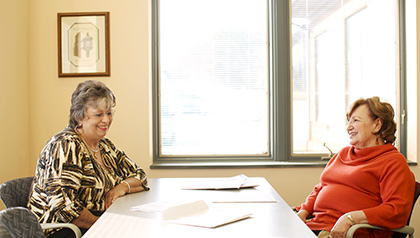AARP Hearing Center

By Michelle Crouch
Three years ago, LaVonda Hill heard about AARP Foundation Tax-Aide, a program that provides free tax preparation.
“I still can’t believe it’s free,” said Hill, 69, of Forest City. “I now use it every year, and it saves me more than $200 each time.”
Even though the Tax-Aide program has been around for decades, many people still don’t know about it, said Amideus D. Athougies, 65, of Rutherfordton, the Tax-Aide volunteer coordinator in North Carolina. And those who have heard about it may not realize they can get help.
Here are six things about the program that North Carolina taxpayers should know:
A free service
Volunteers work one-on-one with taxpayers to prepare their state and federal returns and file them electronically, and it doesn’t cost anything. Nearly 1,100 Tax-Aide volunteers handled almost 92,000 returns in North Carolina last year, and they expect more this year.
For AARP members and nonmembers
The program is designed to serve low- and moderate-income taxpayers 60 and older but will help anyone. A growing number of North Carolina participants in recent years have been people under 50 who can’t afford to pay someone to do their returns, Athougies said. Shelby Lands, 33, of Hendersonville, was surprised when she learned she could get help.
“I always just assumed that AARP tax [assistance] was for seniors,” Lands said. “I was so impressed with the program that I’m going to do it every year.”
No income limit
Tax-Aide volunteers can handle most simple returns, no matter how high or low a person’s income.
“We do people ranging from kids with summer jobs who had taxes taken out of their paychecks all the way up to people with huge portfolio stock transactions,” said Jim Spicer, 76, of Mills River, the local Tax-Aide coordinator.
Among the exceptions: self-employed individuals with annual expenses higher than $10,000, as well as people with farms, business partnerships, rental income and out-of-state returns. Some sites close to North Carolina’s borders can handle neighboring state returns.
Quick, convenient and easy
AARP Foundation Tax-Aide will operate Feb. 1 to April 15 in more than 100 senior centers, libraries and other locations across North Carolina this year. The program even has some volunteers who will make visits to homebound taxpayers.
Some sites require appointments; others do walk-ins only. Most clients have their taxes done in just one visit, Spicer said. To find a nearby site, call 888-227-7669 toll-free or go to aarp.org/findtaxhelp.
Highly trained and IRS-certified preparers
All volunteers must undergo training and pass IRS certification and ethics tests. Janet Aldridge, 67, of Hendersonville, a retired bookkeeper, said she was impressed with the thoroughness of the training.
“There were three days of going over tax law and special cases, and then three days of hands-on training at the computer,” she said.
Volunteers get additional training and are recertified every year to make sure they’re aware of tax law changes. Sometimes AARP volunteers catch mistakes from previous returns. “I helped one fellow who had been doing his own taxes but didn’t know about the Bailey Act, which gives military retirees an exemption from some taxes in North Carolina,” Spicer said. “We were able to get him $2,000 back.”
What to bring
When you visit a Tax-Aide site, remember to bring your 2012 tax returns, a photo ID for the filers and a Social Security card for each person on the return.
Make sure you have all your income statements including W2, 1099 and other forms showing income from interest, dividends, capital gains, stock sales or Social Security.
Bring your receipts for medical and dental bills, prescriptions and insurance premiums; property tax and mortgage interest statements; and receipts for charitable donations and other itemized deductions.
Don’t forget mileage records for volunteer work or for travel to medical appointments, and receipts for improvements, such as ramps and railings, to make a home safer for aging residents.
Finally, have your bank routing and account numbers to receive a direct deposit of your refund.
—Michelle Crouch is a writer living in Charlotte































































